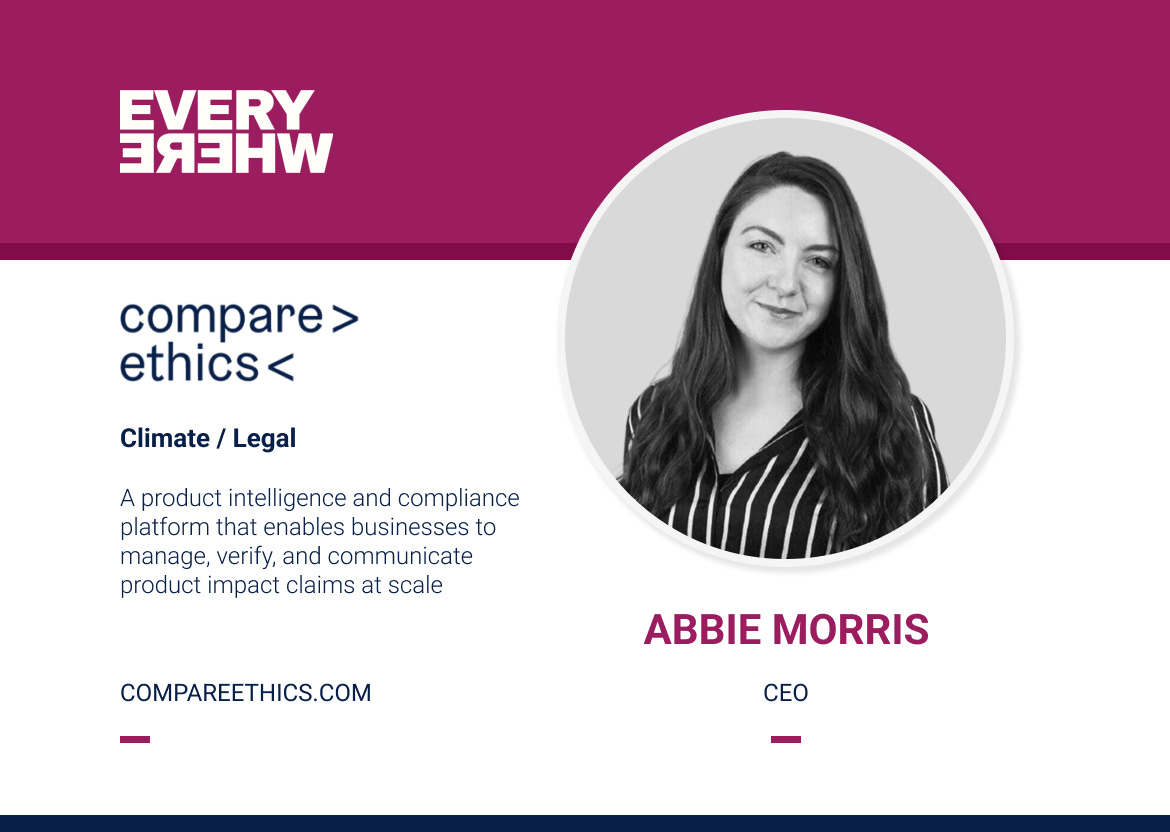Founders Everywhere: Abbie Morris
Abbie Morris is the co-founder and CEO of Compare Ethics, a Product Intelligence and Compliance platform that enables businesses to manage, verify, and communicate product impact claims at scale.
Welcome to Founders Everywhere, where we highlight the incredible people behind the companies we’ve backed at Everywhere Ventures, a global pre-seed fund supported by a community of 500 founders and operators.
Companies claim to be “sustainable” and “environmentally friendly”, but how can they prove it? Not only do consumers want to support sustainable brands, but stakeholder demands and fast-changing global regulations are on the rise, which is putting pressure on businesses to back up their ESG (environmental, social, and governance) claims. Compare Ethics helps companies build trust and transparency by verifying products, providing data-focused insights, and attributing scaleable ratings. This is great for businesses as it reduces the risk and cost of compliance with impact regulations. Compare Ethics has also built their own retail enterprise community with over 200 businesses participating, and welcome others to join the movement.
Abbie Morris, co-founder and CEO of Compare Ethics, spent a decade working in sustainability, with a focus on policy and consulting, having previously worked with her clients at the United Nations, World Economic Forum and Confederation of British Industry (CBI). She was also a part of Google’s first residency program for female founders in the UK. Abbie and her co-founder James Omisakin, an innovation and product specialist, were named to Forbes 30 Under 30 Europe 2020. They were concerned with global impact and the effects of investing in sustainability at scale. Through Compare Ethics, they are empowering all stakeholders to make better choices that will have a net positive impact on the world.
Why Compare Ethics and why now?
I worked in sustainability and policy for about 10 years before founding Compare Ethics. That meant working with corporates, governments, and NGOs and always thinking about how to create impact strategies and then communicate them globally. The issue was, I found that all of my work was on the periphery. It was a really nice press release that you delivered to the United Nations every year, but it was never actually integrating sustainability at the heart of business and I just felt like it wasn't delivering system change. I thought there's a better approach to doing this, to really prove to businesses there’s a way to operationalize sustainability.
What’s Compare Ethics’ “Northstar”?
Our thesis to the market has always been that by delivering lower impact on the planet, you’re going to deliver better results as a business. We’re on a mission to make every business responsible and prove to the market that these are better business performers.
What makes Compare Ethics a must-have versus a nice-to-have?
When you look at the industry across the US, the EU, and the UK, there are so many new ESG regulations. There’s pressure from governments, investors, consumer protection agencies, and even their own employees. So, this is creating a pressure cooker for businesses to take action now and we're riding a really lovely tailwind. For the businesses that don't take action now, they're risking becoming uncompetitive and falling behind. The market is markedly shifting and we're in a very exciting time.
What is Compare Ethics focusing on right now?
Currently, we focus on fashion, as it's one of the biggest polluting industries in the world, which makes it a great place to start. It also has a super complex supply chain. So, method or madness, if we can do it for apparel, we can do it for any supply chain. We have other companies in different industries, but we want to stay focused on fashion and then scale out the verticals over the next few years.
Any podcast or book recommendations?
I’m definitely a podcast person. As someone with a two year old, podcasts are a great way to access new insights. I really like The High Performance podcast. They actually interview a lot of sports people and that provides many comparables when you're thinking about playing for endurance in startup mode. I also like Jay Shetty's podcast On Purpose for the mindset perspective. The mixture provides a nice juxtaposition that is super optimized, efficient, high performance, and a bit of mindfulness to balance it out.
For books, I would strongly recommend Mo Gawdat’s That Little Voice in Your Head and the classic Man's Search for Meaning by Viktor Frankl.

